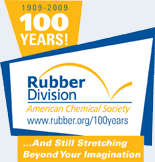The Introduction of Fuel Resistant Polyacrytate
David Tao
,
Zeon Chemicals L. P., Louisville, KY
The use of polyacrylic (ACM) elastomers has become quite common in the manufacture of heat and oil resistant gaskets and seals. ACM elastomers have proven to withstand the high temperatures required in many of today’s automotive applications. Although ACM polymers have remarkable resistance to oil and perform quite well in applications involving diesel fuel contact, they are generally not considered appropriate in applications where gasoline contact is probable. However, a recently introduced ACM polymer grade may change the perception of ACM and hydrocarbon fuels. In order to narrow the gaps between high-temperature performance, fuel resistance, and cost, Zeon Chemicals L.P. has recently developed a fuel resistant ACM polymer known as HyTemp® AR13FR. When tested in low molecular weight, hydrocarbon fuels such as gasoline, this new ACM polymer has comparable fuel resistance to that of a mid-range, acrylonitrile rubber but with the heat resistance of high-temperature ACM technology. This paper presents the improved level of fuel and oil resistance offered by this new grade of polyacrylate elastomer. These improvements in performance open up new application areas to ACM based compounds for service articles that experience incidental fuel contact.
|
![[ Visit ACS Rubber Website ]](images/logo.jpg)
